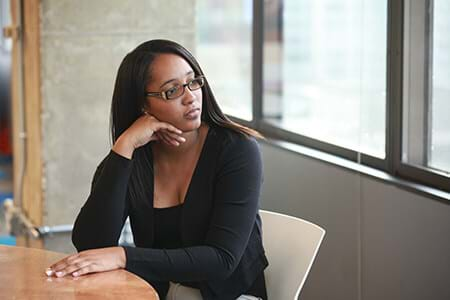Uterine fibroids, or noncancerous tumors that grow on or in the uterine wall, affect a large percentage of African American women who are over the age of 45. They can lead to uncomfortable and sometimes debilitating symptoms, but they can also cause great stress in a relationship. Many experts believe that the incidence of fibroids and fibroid symptoms are underreported, and that women suffering from this condition receive very little emotional support – support that might help them deal with the symptoms and the treatment for uterine fibroids.
Many women are too embarrassed to share their misery from fibroid symptoms with their doctors, their partners, or even their closest friends. Women from all backgrounds are forced to deal with a similar lack of support and understanding of just how much fibroid symptoms can affect everyday life, but African American women are several times more likely to experience severe fibroid symptoms.
At the 2014 annual meeting of American Society for Reproductive Medicine, two studies were presented that give a glimpse into the emotional struggles faced by women who suffer from large fibroids in the uterus. These studies assessed 48 women from an urban medical center and community organizations.
Each woman filled out questionnaires and then underwent a one-on-one interview regarding their emotional responses to having uterine fibroids. The patients included in the study were African American (62.5%), Caucasian (20.8%), Hispanic (10.4%), or Asian (6.3%). Most of them held a four-year degree, and they had similar annual incomes and educations.
The first study found that most of the women experienced negative emotions surrounding uterine fibroids. In particular, they felt things such as worry, fear, anxiety, and depression in response to having fibroids in the uterus. Some symptoms of fibroids, such as heavy periods, also led many of the women to report feeling out of control. For many women, emotional struggles included low self-esteem due to feeling overweight, looking pregnant, and feeling unattractive. These emotional responses to fibroids in the uterus made it difficult for many women to enjoy intimacy with their partners.
In addition to identifying these emotional struggles, the first study found that there was little support to help women navigate their feelings. For example, only 2% of participants sought help from a professional. The second study highlighted how women of different ethnicities responded to treatments for fibroids in the uterus. It focused on the different emotional experiences that occurred among women of different ethnicities. For example, while 90% of all participants reported feeling as if they had not been made aware of all their treatment options, African American women were more interested in non-surgical treatment options and likelihood of treatment success.
In addition, African American women who had fibroid surgery were more likely to be unhappy with their choice and to struggle with recovery. Very few respondents were aware of minimally invasive treatments like Uterine Fibroid Embolization.
Both of these studies highlight the need for more education and mental health support for women with uterine fibroids.
The doctors at VivaEve have years of experience in the treatment of both uterine fibroids and adenomyosis through Uterine Fibroid Embolization (UFE). We are committed to providing high-quality, personalized care for each and every patient we see and will partner with you to determine the best way to treat your problematic fibroids or adenomyosis.

